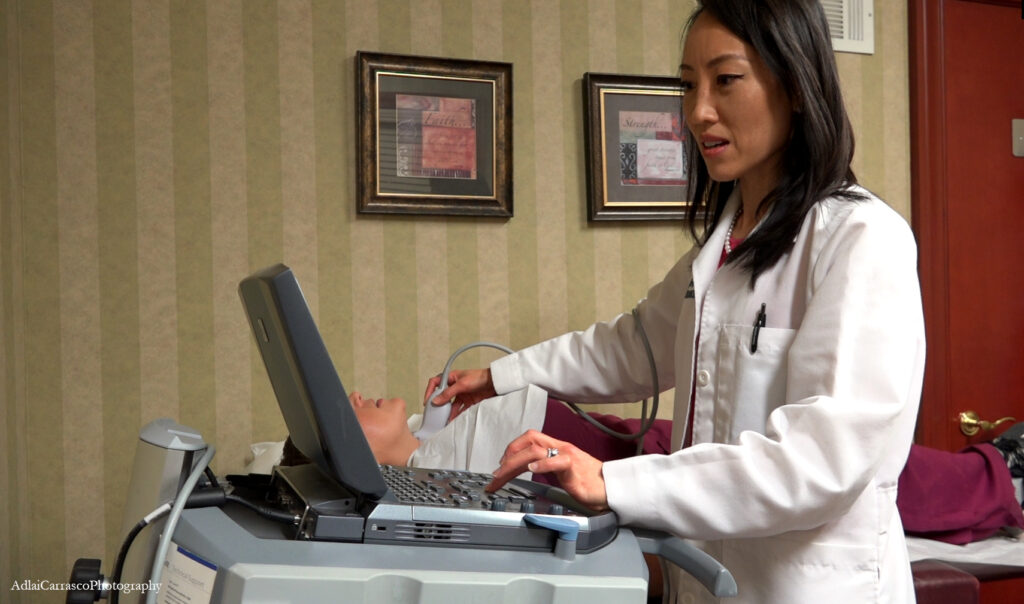Hyperthyroidism
What Is Hyperthyroidism?
The thyroid gland is a butterfly-shape organ and is composed of two cone-like lobes or wings, connected via the isthmus. The organ is situated on the anterior side of the neck, lying against and around the larynx and trachea. It is difficult to demarcate the gland’s upper and lower border with vertebral levels because it moves position in relation to these during swallowing.
The thyroid gland is controlled by the hypothalamus and pituitary (to be specific, the anterior pituitary). The thyroid gland gets its name from the Greek word for “shield”, after the shape of the related thyroid cartilage. The most common problems of the thyroid gland consist of nodules, cancer, and an over-active thyroid gland, referred to as “hyperthyroidism”, and an under-active thyroid gland referred to as “hypothyroidism”.
Hyperthyroidism occurs when the thyroid is overactive and produces excessive amounts of hormones.

What Are The Causes Of Hyperthyroidism?
Several conditions can trigger hyperthyroidism:
Hashitoxicosis: An autoimmune condition, often associated with Hashimoto’s thyroiditis, that leads to a surge in thyroid hormone production.
Graves’ Disease: Another autoimmune disorder where the immune system attacks the thyroid, causing it to overproduce hormones.
Toxic Adenoma: The presence of a single nodule that becomes overactive and produces excess hormones.
Toxic Multinodular Goiter: Multiple nodules in the thyroid gland become hyperactive.
Subacute Thyroiditis: Inflammation of the thyroid, often preceded by a viral infection.
Subclinical Hyperthyroidism: Mild hyperthyroidism with minimal or no symptoms.
What Are The Signs And Symptoms Of An Overactive Thyroid?
Hyperthyroidism can manifest through a range of symptoms, which may vary among individuals:
Fast Heart Rate (Palpitations): Sensation of rapid or irregular heartbeat.
Weight Loss: Unexplained weight loss despite regular eating habits.
Increased Appetite: An intense desire to eat more than usual.
Diarrhea: Frequent and loose bowel movements.
Stare and Lid Lag: Staring appearance and a noticeable lag in the movement of eyelids.
Bulging Eyes: Eyes protruding from their sockets, known as exophthalmos.
Tremors: Shaking or trembling, especially in the hands.
Mood Swings: Fluctuations in mood, ranging from agitation and anxiety to depression or even mania.
Insomnia: Difficulty falling asleep or staying asleep.
Warm Skin and Sweating: Skin feels warmer than usual, accompanied by excessive sweating.
Acceleration of Growth: Increased growth rate, especially in children.
Changes in Menstruation: Irregular menstrual cycles in women.
Enlarged Thyroid Gland: Visible enlargement of the thyroid gland located in the neck.
What Are The Risk Factors Of Hyperthyroidism?
Several factors may elevate the risk of developing hyperthyroidism:
Genetics and Family History: A family history of thyroid disorders increases susceptibility.
Radiation Therapy: Exposure to neck radiation, often due to medical treatments, can contribute.
High Iodine Intake: Excessive consumption of iodine-rich foods or supplements.
Medications: Certain medications like lithium, interferon alfa, and amiodarone may trigger hyperthyroidism.
How Is Hyperthyroidism Diagnosed?
Diagnosing hyperthyroidism involves a series of tests:
Thyroid Function Tests: Measures levels of thyroid hormones (TSH, FT4, FT3) in the blood.
Thyroid Antibodies: Checks for thyroid-related antibodies like TSI, TRAB, TPO, TG.
Thyroid Uptake and Scan: Assesses the thyroid’s ability to absorb iodine.
hyroid Ultrasound: Visualizes the thyroid gland to identify any structural abnormalities.
What Are The Possible Treatments For An Overactive Thyroid?
Hyperthyroidism management entails several options:
Medications: Beta-blockers alleviate symptoms temporarily, while antithyroid medications (Methimazole, Propylthiouracil) reduce thyroid hormone production.
Radioiodine Therapy: Oral intake of radioactive iodine 131 to target and destroy overactive thyroid cells.
Thyroid Surgery: Surgical removal of the thyroid gland, in cases where other treatments are not suitable.
Are There Preventative Steps Or Measures To Avoid Hyperthyroidism?
Preventing hyperthyroidism is challenging, but effective treatment is available. If left untreated, hyperthyroidism can lead to serious complications:
Heart Disease: Untreated hyperthyroidism can strain the heart, potentially leading to heart problems.
Bone Loss: Increased risk of osteoporosis due to accelerated bone turnover.
Muscle Weakness: Reduced muscle strength and endurance.
Irregular Menstrual Cycles: Women may experience irregular or absent menstrual periods.
What Are The Risks If Hyperthyroidism Is Left Untreated?
If untreated, hyperthyroidism can cause serious problems with the heart disease, bone loss, muscle weakness, and irregular menstrual cycle.
Are There Other Related Conditions To Hyperthyroidism?
If hyperthyroidism is caused by Graves’ Disease, which is an autoimmune disease, the patient may be at risk for other autoimmune conditions.

